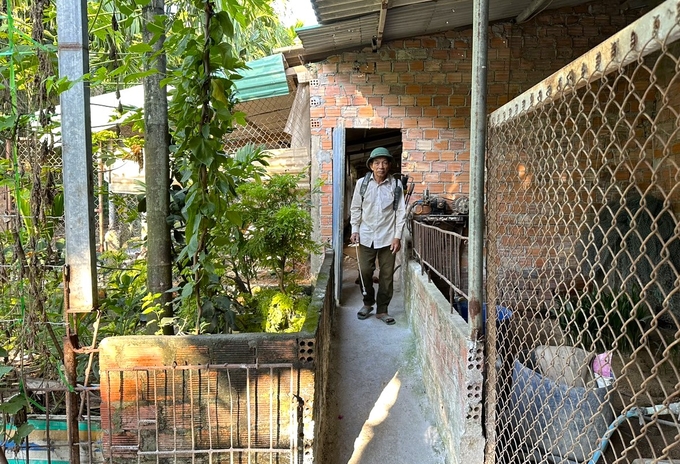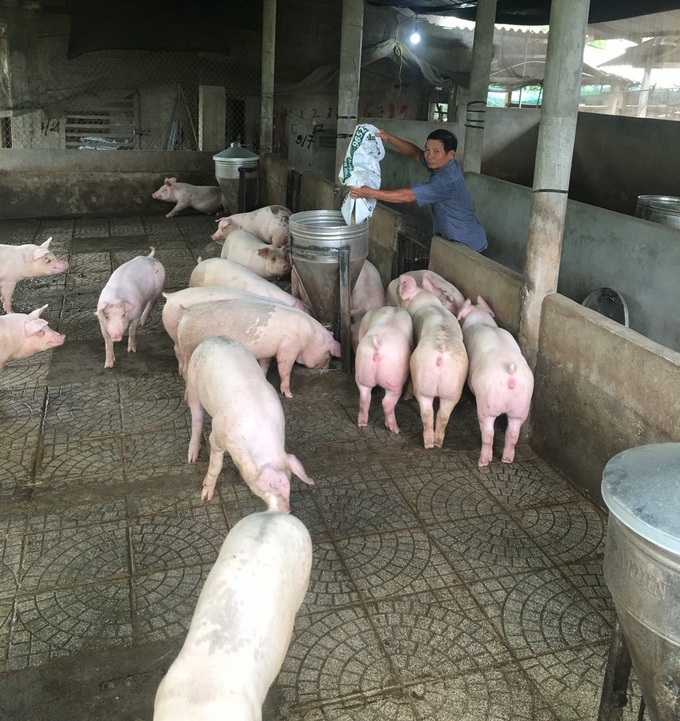November 25, 2025 | 17:23 GMT +7
November 25, 2025 | 17:23 GMT +7
Hotline: 0913.378.918
November 25, 2025 | 17:23 GMT +7
Hotline: 0913.378.918

Quang Ngai province currently has only 42 concentrated pig farms with the remaining following small-scale or household-based models. Photo: L.K.
According to the statistics compiled by Quang Ngai province's Department of Livestock Production and Animal Health, the total number of pigs in the province is approximately 385,000, not including piglets. However, there are currently only 42 concentrated pig farms Quang Ngai province whereas the remaining are following small-scale or household-based models.
With the household-based farming approach, most families utilize the garden areas around their homes or residential areas to build pig pens. This not only leads to environmental pollution but also poses the risk of disease outbreaks, as pigs come into contact with different pathogen carriers, resulting in a difficult disease control and management.
Based on the observations made at various pig farming households, many farmers have become aware of the aforementioned issue. Namely, the pig pen belonging to Ms. Pham Thi Se in Dai An Dong hamlet, Hanh Thuan commune, Nghia Hanh district is located within a residential area. Due to the lack of a drainage system for pig waste, the area around her pig pen often emits foul odors.
"I have refrained from raising too many pigs after learning of the issues surrounding pig disease. I only raise one crop per year in oder to make use of excess feed. Additionally, a portion of the waste is processed into gas for cooking. During the last few months of the year, my family temporarily suspends pig farming activities to facilitate the handling of excess waste, and avoid impacting the lives of neighboring households," Ms. Se explained.

Mr. Tran Van Truc's pig farm located in Hanh Thuan commune, Nghia Hanh district, Quang Ngai province, follows a closed-loop and bio-secure model. As a result, it has remained unaffected by the African Swine Fever over the past years. Photo: L.K.
Recognizing that small-scale household farming within residential areas leads to environmental issues and disease risks, Quang Ngai province has introduced incentives, support mechanisms, and initiatives to attract businesses and cooperatives to invest in concentrated pig farming. Furthermore, the province encourages pig and poultry farms to adopt closed-loop and bio-secure models to minimize disease risks.
As a result, Quang Ngai province has seen the emergence of farms and households implementing high-tech and bio-friendly agricultural practices. Many pig farming households utilize closed-loop farm and cold farm systems to reduce dependence on weather conditions, and actively engage in disease control measures for sustainable livestock production.
Most notably, Mr. Tran Van Truc's farm, located in An Phu hamlet, Hanh Thuan commune, Nghia Hanh district, has been operating under the closed-loop model for several years. Feed sources are strictly controlled, and regular disinfection is carried out weekly to prevent the emergence of diseases. As a result, Mr. Truc's farm has remained unaffected since the African Swine Fever outbreak in 2019. Additionally, the pigs are healthy and reach a weight of over 100 kilograms every sale season, resulting in a profit of approximately 1 million VND per pig after expenses.
According to Quang Ngai province's Department of Livestock Production and Animal Health, the province has approved a strategic development plan with a focus on sustainable development for the livestock sector until 2030, with a vision towards 2045. Accordingly, the province aims to transition from small-scale household farming to the development of technology-intensive and concentrated livestock farming model. On the other hand, small-scale household farming models will be maintained if they meet environmental and safety requirements.
Quang Ngai province will allocate land resources for the development of concentrated livestock farming to comply with livestock laws, and ensure environmental protection and disease safety. Additionally, the province will promote bio-safe farming practices and Good Agricultural Practices (VietGAP) for livestock farming facilities. Moreover, efforts will be made to increase mandatory vaccination rates and implement measures to control dangerous pathogens, ensuring disease-free herds of livestock and poultry.
Regarding the issue of disease control among small-scale farmers, many animal health officials in Quang Ngai province acknowledge the challenges that the task imposes. There is a multitude of factors contributing to this challenge, with the most important being the unreliable source of livestock breeds. In the majority of cases, small-scale farmers procure breeding stock from individual sellers, and piglets are typically sold once they reach a specified age without undergoing mandatory vaccination or inspection procedures.
Translated by Nguyen Hai Long
/2025/11/24/3536-2-112800_176.jpg)
(VAN) Dong Nai now has tens of thousands of hectares of forests certified for sustainable management, and this area will continue to be expanded in the coming period.

(VAN) Vinh Ha hamlet (Dai Xuyen commune, Hanoi) is shifting away from small-scale farming as households adopt bioscurity into their breeder chicken models.

(VAN) Heavy rains make aquatic species more vulnerable to disease. Proactive water management and high-tech systems help farmers prevent outbreaks and protect yields.

(VAN) Greenhouses are shifting production mindsets in Binh Lu commune, enabling farmers to ‘weather the sun and rain’ and secure stable vegetable harvests throughout the year.

(VAN) Green transition is crucial for the Mekong Delta amid climate change and stricter standards, offering a path toward sustainability.

(VAN) Dong Thap promotes agricultural restructuring, forms large specialized farming zones, raises the value of agricultural products and develops toward ecological and high-tech directions.
/2025/11/22/4018-4-213342_747.jpg)
(VAN) The Mekong Delta Agricultural Experts Club has attracted 143 experts and researchers to participate in providing consultancy and contributing initiatives to the development of one million hectares of high-quality rice.